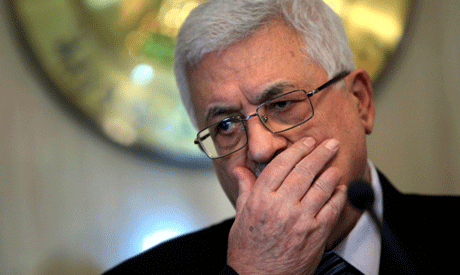
Palestinian Authority President, Mahmoud Abbas (Photo: AP)
The United Nations called for international donations to help the Palestinian Authority through a "critical" cash shortage.
The call came as Arab envoys at the UN stepped up demands for international action to halt Israeli settlement building in the occupied territories.
A financial crisis has been growing for President Mahmoud Abbas's government this year, UN Special Coordinator for the Middle East Peace Process Robert Serry told the UN Security Council.
Saudi Arabia last week gave $100 million to help the Palestinian Authority pay salaries that were due in June.
Serry said Israel handed over value added tax revenues that it collects for the authority two weeks in advance last week "to assist with the payment of salaries ahead of the holy month of Ramadan."
"We call on other donors, particularly other Gulf countries, to consider a timely donation during this period of critical shortage," Serry said.
The Palestinian Authority said at the start of the year that it has $1.5 billion in debt to banks and companies and was expecting a $1 billion shortfall in its $3.5 billion annual budget.
The UN envoy said that the cash respite for the Palestinian Authority would be "brief" unless new donations are made.
The United States, a major donor to the authority, has also sent warnings about the cash crunch.
"The international community, along with the Palestinian people, has invested a great deal in the Palestinian Authority's institution-building efforts," said Jeffrey DeLaurentis, deputy US ambassador to the United Nations.
"Sustaining that effort is now in jeopardy, as the Palestinian Authority faces its worst financial crisis ever."
The financial crisis has added to the problems Abbas faces as he confronts political deadlock in efforts to end the Middle East conflict.
Talks with Israel have been suspended since September 2010 and the Israeli government has increased the number of permits for new housing in the occupied territories -- construction that the United Nations calls illegal.
Even the United States, Israel's closest ally, says the settlement building is not legitimate. But the United States last year vetoed a Security Council statement condemning the Israeli settlements.
Eleven Arab ambassadors at the UN issued a statement after the meeting to demand greater action to halt the settlement activity.
"The Arab group deplores the inability or unwillingness of the Security Council to take the measures necessary to end Israeli occupation," said the statement read to reporters by Saudi Ambassador Abdallah al-Mouallimi.
"Israel continues unabated its policy of expanding settlement activities throughout the West Bank. It continues its attempts to change the nature and character of the city of Jerusalem, including by confiscation of land and eviction of Palestinian citizens.
"We call upon the council to act promptly to salvage the diminishing chances for peace."
The Security Council must put an end to Israel's "siege of Gaza and to the occupation of West Bank, Golan Heights and Lebanese occupied territory," the envoys added.
The Palestinians have demanded an end to settlement building before they hold new direct talks.
During the debate, Israel's Deputy UN Ambassador Haim Waxman renewed calls for the Palestinian leadership to return to peace talks without conditions.
"They should remember that a real Palestinian state will only be created through direct negotiations -- and not UN resolutions," Waxman said. "It is time for them to drop their preconditions and sit down with Israel in a spirit of compromise."
Short link: